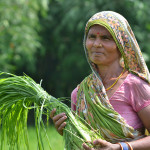This is one of several angles that Lynn Brown, independent consultant, assesses in the GCAN Policy Note No. 9. Aflatoxins affect all of Africa and the severity of the impact might well grow under climate change (as a forthcoming GCAN modeling study by IFPRI and the University of Florida is currently assessing). The two key […]
The Impact of Rising Carbon Dioxide Levels on Crop Nutrients and Human Health
Carbon dioxide (CO2 ) levels are rising globally at a rapid pace, on track to surpass 550 parts per million (ppm) by midcentury. Studies have found that, when grown under elevated CO2 concentrations of 546–586 ppm, many food crops—including wheat, rice, barley, and soybeans—have lowered concentrations of nutrients, including many that are important for overall health, such as iron, zinc, and protein. Elevated CO2 also […]
Implications of wide-scale cropland restoration: A crucial element of the forest landscape restoration approach
The results of this study reveal that the full inclusion of crop production in the forest landscape restoration approach could produce largescale, worldwide benefits for food security and therefore facilitate a wide uptake of restoration practices and the implementation of large restoration projects. The positive impacts are multifaceted and significant in size: a reduction in […]
For climate change, the American farmer is the sleeping giant
By Timothy Thomas The most recent National Climate Assessment found that temperatures across the United States have already risen by more than 1 degree on average due to climate change. So, if we’re already feeling the effects of climate change, why do so many Americans remain skeptical of it? Part of the reason may be that while […]




